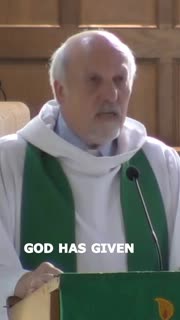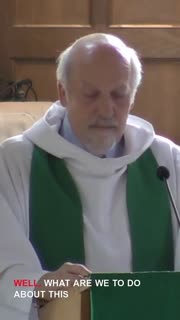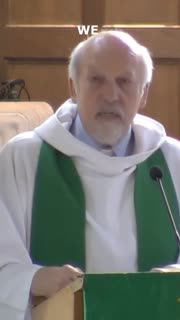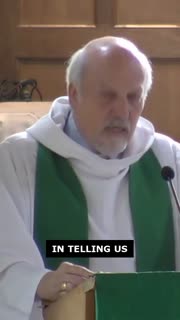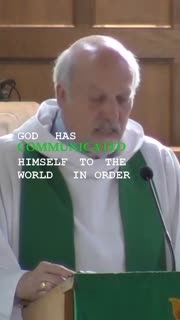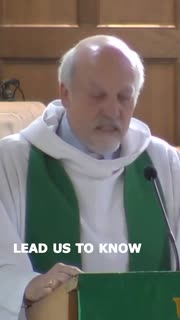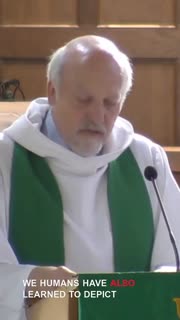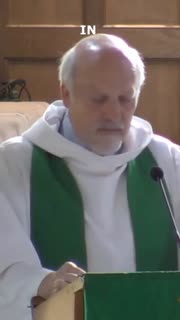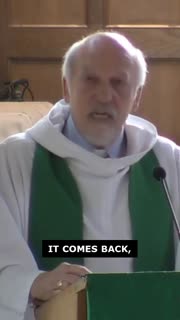Communicating God's Love: The Gift of Discipleship
Devotional
Sermon Summary
Bible Study Guide
Sermon Clips
1. "God has given humans the gift of communication, and we should value it greatly and use it wisely. importance of words in communication is not just about words, but about people. spoken written electronically produced the wonder of being able to impart what we're thinking what we're feeling and wondering about the world around us or the way we are or the way we should be trying to live our lives is something I think for which we should always thank God communicating is what people are doing all the time more or less successfully it's built into us and it makes us social beings." [22:15] (45 seconds)
2. "Well, what are we to do about this belief that God does communicate with us, and supremely so, through Jesus. I think we're probably in the position of Peter and it's his reply which gets to the heart of things. He has heard the words of Jesus. He's had that growing relationship with him and those words have about them the ring of truth and speak of a deeper reality than anything else experienced by senses alone and those words have communicated an awareness of eternity and he says Lord to whom can we go? You have the words of eternal life." [29:24] (52 seconds)
3. "We humans have learned to communicate primarily by what we utter from our mouths. We are unique, aren't we, among creatures, in having the ability to speak languages with particular structures, rule patterns, and so on, and so on. We can change the meaning of words over the centuries to communicate with each other and to express through words those little nuances that we learn as we grow up. Although, of course, it's not the only way by which we communicate, because we also communicate by touch, by sight and sound, through art, as well as by our actions." [20:28] (48 seconds)
4. "In telling us that some of Jesus' disciples decided to go off and never go with him anymore, St. John is perhaps saying to us, well, you have to acknowledge that Christian belief and discipleship have a way of sorting people out. And some, you get to a point where they say, I just can't take this, can't keep this up any longer. Of course, people do leave the church for various reasons, matters of worship, style and preferences or regularity, they just fall out of the habit. Maybe loss of faith sometimes, perhaps because of a tragedy in their life, or because those who profess to be Christians no longer meet their expectations." [27:26] (55 seconds)
5. "The Jews of the Old Testament believed that God had been made known through his words to Moses and the prophets and they had committed themselves to God in a covenant relationship it was by remembering this voicing this in words communicating it to others that God's name and presence were known to them and they were able to communicate it to others and this is sort of what we heard Joshua reminding the people about and asking them to recommit themselves to in the Old Testament reading today." [25:40] (44 seconds)
6. "God has communicated himself to the world in order to bring light and life to human hearts and minds and souls. He opens his gospel reading telling us that. So in Jesus, God is sharing himself with humanity. And that's the ultimate in communication that we could relate to, word made flesh. But this is not the end. is, of course, difficult teaching. It's likely to offend people, even scandalize them." [27:26] (37 seconds)
7. "We are trying our best to communicate to others the one who has the words of eternal life whom we have come to believe and know is the holy one of God. the questions are always will we do it and will we do it? We are all one in Christ Jesus. We belong to him through faith. We are the heirs of the promise of the Spirit of peace. The peace of the Lord be always with you." [31:30] (60 seconds)
8. "We humans have also learned to depict spoken words by developing writing originally to safeguard the words deemed to be too important to be forgotten or lost, such as religious texts, a nation's history, laws, traditions. And which need to be communicated to later generations. And nowadays, of course, we talk about being in a digital age, where words are transmitted millions of times a day across many nations on different social platforms. And yet, despite the wonders of modern technology, we still face important questions about effective, safe, respectful, thoughtful, caring communication between people." [21:12] (56 seconds)
9. "In the beginning God said let there be and Saint John begins his gospel with the same idea in the beginning was the word and the word was with God and the word was God speak about God and we're immediately into thoughts about creation and questions about why God created for what purpose and what is God's nature does God communicate with us and can we communicate with God I think there's a clue to finding some answers to these questions in the word communicate whose meaning comes from the Latin word communicare or to make common and so to impart or to inform it turns up in words like community communal or commune with so if we understand that communication or sharing with is a gift of God." [23:47] (74 seconds)
10. "It comes back, I think, to communication, a willingness to receive what God is communicating and making our response by allowing ourselves to be drawn to Jesus, the Word made flesh, whose words are spirit and life, whose life is given for the life of the world." [29:24] (23 seconds)
Ask a question about this sermon
2. "Well, what are we to do about this belief that God does communicate with us, and supremely so, through Jesus. I think we're probably in the position of Peter and it's his reply which gets to the heart of things. He has heard the words of Jesus. He's had that growing relationship with him and those words have about them the ring of truth and speak of a deeper reality than anything else experienced by senses alone and those words have communicated an awareness of eternity and he says Lord to whom can we go? You have the words of eternal life." [29:24] (52 seconds)
3. "We humans have learned to communicate primarily by what we utter from our mouths. We are unique, aren't we, among creatures, in having the ability to speak languages with particular structures, rule patterns, and so on, and so on. We can change the meaning of words over the centuries to communicate with each other and to express through words those little nuances that we learn as we grow up. Although, of course, it's not the only way by which we communicate, because we also communicate by touch, by sight and sound, through art, as well as by our actions." [20:28] (48 seconds)
4. "In telling us that some of Jesus' disciples decided to go off and never go with him anymore, St. John is perhaps saying to us, well, you have to acknowledge that Christian belief and discipleship have a way of sorting people out. And some, you get to a point where they say, I just can't take this, can't keep this up any longer. Of course, people do leave the church for various reasons, matters of worship, style and preferences or regularity, they just fall out of the habit. Maybe loss of faith sometimes, perhaps because of a tragedy in their life, or because those who profess to be Christians no longer meet their expectations." [27:26] (55 seconds)
5. "The Jews of the Old Testament believed that God had been made known through his words to Moses and the prophets and they had committed themselves to God in a covenant relationship it was by remembering this voicing this in words communicating it to others that God's name and presence were known to them and they were able to communicate it to others and this is sort of what we heard Joshua reminding the people about and asking them to recommit themselves to in the Old Testament reading today." [25:40] (44 seconds)
6. "God has communicated himself to the world in order to bring light and life to human hearts and minds and souls. He opens his gospel reading telling us that. So in Jesus, God is sharing himself with humanity. And that's the ultimate in communication that we could relate to, word made flesh. But this is not the end. is, of course, difficult teaching. It's likely to offend people, even scandalize them." [27:26] (37 seconds)
7. "We are trying our best to communicate to others the one who has the words of eternal life whom we have come to believe and know is the holy one of God. the questions are always will we do it and will we do it? We are all one in Christ Jesus. We belong to him through faith. We are the heirs of the promise of the Spirit of peace. The peace of the Lord be always with you." [31:30] (60 seconds)
8. "We humans have also learned to depict spoken words by developing writing originally to safeguard the words deemed to be too important to be forgotten or lost, such as religious texts, a nation's history, laws, traditions. And which need to be communicated to later generations. And nowadays, of course, we talk about being in a digital age, where words are transmitted millions of times a day across many nations on different social platforms. And yet, despite the wonders of modern technology, we still face important questions about effective, safe, respectful, thoughtful, caring communication between people." [21:12] (56 seconds)
9. "In the beginning God said let there be and Saint John begins his gospel with the same idea in the beginning was the word and the word was with God and the word was God speak about God and we're immediately into thoughts about creation and questions about why God created for what purpose and what is God's nature does God communicate with us and can we communicate with God I think there's a clue to finding some answers to these questions in the word communicate whose meaning comes from the Latin word communicare or to make common and so to impart or to inform it turns up in words like community communal or commune with so if we understand that communication or sharing with is a gift of God." [23:47] (74 seconds)
10. "It comes back, I think, to communication, a willingness to receive what God is communicating and making our response by allowing ourselves to be drawn to Jesus, the Word made flesh, whose words are spirit and life, whose life is given for the life of the world." [29:24] (23 seconds)
